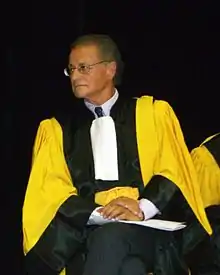Paolo Fabbri | |
|---|---|
 Fabbri in 2013 | |
| Born | 17 April 1939 |
| Died | 2 June 2020 (aged 81) Rimini, Emilia-Romagna, Italy |
| Academic background | |
| Alma mater | |
| Academic work | |
| Discipline | Semiotics |
| Institutions |
|
Paolo Fabbri (17 April 1939 – 2 June 2020) was an Italian semiotician.[1]
Early life and education
Fabbri was born in Rimini in 1939,[1] graduating from the city's classical lyceum in 1957.[2]
He studied at the University of Florence, graduating in 1962,[3] and at the École Pratique des Hautes Études in Paris, where he was taught by Roland Barthes, Lucien Goldmann, and Algirdas Julien Greimas.[1][3]
Academic career
Returning to Italy in 1966,[3] Fabbri taught at the University of Florence's Faculty of Architecture alongside Umberto Eco;[1][3] Fabbri inspired the character of "Paolo da Rimini" in Eco's debut novel, The Name of the Rose (1980).[3][4]
In 1967,[3] Fabbri moved to the University of Urbino as Professor of Philosophy of Language. In 1970, he cofounded the university's International Centre of Semiotics and Linguistics (CiSS) with Carlo Bo and Giuseppe Paioni, one of the earliest schools of semiotics.[1][3] He developed a reputation for not publishing his research in the semiotic field, leading to his nickname of abbas agraphicus (the abbot who does not write),[3][4] to which Fabbri replied that "the professor is oral", transmiting more knowledge through meeting than texts.[4]
Fabbri moved to the University of Bologna in 1977, teaching the Semiotics of Arts course in the degree for Arts,[3] Music and Entertainment, over which he presided from 1997 to 2001. From 1990 until 2003, he was part of the Department of Visual Arts of the Faculty of Literature and Philosophy.[4]
Between 1984 and 1991, he collaborated in semiotician research conferences hosted at the School for Advanced Studies in the Social Sciences.[3]
Fabbri taught at the University of Palermo's Faculty of Education between 1986 and 1990. Between 2003 and 2009, he was Professor of Semiotics of Art and Artistic Literature at the IUAV University of Venice's Faculty of Design and Arts.[3]
In 2013, Fabbri became director of CiSS. In 2017, Fabbri was made honorary professor at the universities of Santiago and Lima.[3]
Cultural activities
During his life, Fabbri sat of the committee of several cultural institutions, including the Fellini Musuem in Rimini,[3] and the 400th anniversary of the Biblioteca Civica Gambalunga,[5] to which he donated fifty philosophical works and manuscripts in April 2019.[6]
Fabbri's appointments to other cultural entities included as:[3]
- Director of the Italian Cultural Institute in Paris (1992–96)
- Director of Cattolica's Mystfest, a festival of international crime and mystery (1996–97)
- Scientific advisor to the Prix Italia (1999–2001)
- President of Florence's Festival dei Popoli (2000–04)
- President of the Institut de la Pensée Contemporaine of Paris Diderot University (2004–06)
- Director of Rimini's Federico Fellini Foundation (2011–13)
Personal life and death
In December 2019,[5] Fabbri was awarded the Sigismondo d'Oro, the highest civic award offered by Rimini's municipal government, alongside Marco Missiroli.[3][7]
Fabbri owned a villa on the Covignano hill outside Rimini.[4]
Fabbri died on 2 June 2020.[1] Among those releasing public condolonces were Andrea Gnassi, Rimini's municipal mayor,[5] Stefano Bonaccini, President of the Emilia-Romagna Region, and regional councillor Emma Pettiti.[8]
Publications
- Pertinence et adéquation (1992)
- Tactica de los signos. Ensayos de Semiotica (1995)
- La svolta semiotica (Laterza, 1998)[4]
- Au nom du sens: autour de l'œuvre d'Umberto Eco (2000)
- Gianfranco Baruchello. Flussi, pieghe, pensieri in bocca (2007)
- La competenza semiotica (Carocci: Rome, 2012), with Dario Mangano
- Elogio del conflitto (Sequitur: Madrid, 2017)[3]
- LÉfficacia semiotica (Mimesis: Milan, 2017)[3]
- Maurizio Cattelan: Victory is not an Option (2019)
- Vedere ed arte. Iconico e icastico (Mimesis, 2020)[1]
References
- 1 2 3 4 5 6 7 Crinò, Lara (2 June 2020). "Addio al semiologo Paolo Fabbri, ha svelato i meccanismi del linguaggio e dell'arte" [Farewell to the semiologist Paolo Fabbri, who revealed the mechanisms of language and art]. La Repubblica (in Italian). Retrieved 9 January 2024.
- ↑ "La nostra storia" [Our history]. Liceo Giulio Cesare–Manara Valgimigli. Retrieved 8 January 2024.
- 1 2 3 4 5 6 7 8 9 10 11 12 13 14 15 16 17 Torri, Tommaso (2 June 2020). "Si è spento il semiologo Paolo Fabbri, allievo di Umberto Eco e professore dell'Alma Mater" [The semiologist Paolo Fabbri, student of Umberto Eco and professor at the Alma Mater, has passed away]. RiminiToday (in Italian). Retrieved 9 January 2024.
- 1 2 3 4 5 6 "La famiglia Fabbri apre la propria villa di Covignano per l'ultimo saluto al professor Paolo" [The Fabbri family opens their villa in Covignano for a final farewell to Professor Paolo]. RiminiToday (in Italian). 3 June 2020. Retrieved 9 January 2024.
- 1 2 3 "Gnassi ricorda Paolo Fabbri: "Rimini perde oggi qualcosa di infinitamente grande"" [Gnassi remembers Paolo Fabbri: "Rimini today loses something infinitely great"]. RiminiToday (in Italian). 2 June 2020. Retrieved 9 January 2024.
- ↑ "Il semiologo Paolo Fabbri dona alla Gambalunga i libri antichi appartenuto alla madre" [The semiologist Paolo Fabbri donates to Gambalunga the ancient books that belonged to his mother]. RiminiToday (in Italian). 13 April 2019. Retrieved 9 January 2024.
- ↑ "Al semiologo Paolo Fabbri e allo scrittore Marco Missiroli il "Sigismondo d'oro 2019"" [The "Golden Sigismondo 2019" goes to the semiologist Paolo Fabbri and the writer Marco Missiroli]. RiminiToday (in Italian). 10 December 2019. Retrieved 9 January 2024.
- ↑ "Il cordoglio di Bonaccini per la morte di Paolo Fabbri: "Intellettuale che ha saputo innovare"" [Bonaccini's condolences for the death of Paolo Fabbri: "Intellectual who knew how to innovate"]. RiminiToday (in Italian). 2 June 2020. Retrieved 9 January 2024.